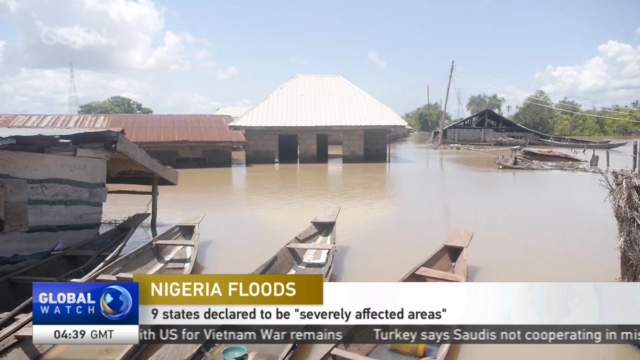
14:44, 14-Oct-2018
Nigeria Floods: 9 states declared to be 'severely affected areas'
Updated
14:21, 17-Oct-2018
02:24

In Nigeria, a national disaster has been declared in 9 states, due to ongoing flooding. The rainy season in the country is almost coming to an end, but water levels may take time to recede. Nearly 2-hundred people have been killed in the floods. CGTN's Kelechi Emekalam has more.
Adamawa, Taraba, Rivers, Kebbi and Bayelsa are the latest to be added on the list of severely affected states.
This has now increased the number of states where a state of national disaster has been declared to 9.
Last month the agency declared national disaster in Kogi, Niger, Anambra and Delta.
The agency says at least 199 have been killed, 2 million are affected by the floods.
600,000 of those have had their homes submerged and are now living in displaced people's camps or in host communities.
Although the rain season is nearing an end and water levels have started receding in the northern state, more flood water continue to be discharged in several states in the south.
MUSTAPHA MAIHAJA DIRECTOR, NEMA "I have said earlier on, it's receding up north but it's flowing down the south there by creating more havoc in other areas. That is the reason why we had to declare state of national disaster in some additional 5 states."
Nigeria's government has already provided $8 million for emergency response in the affected states but asked for more funding from donors.
And the European Union has now provided over $1 million to boost emergency response.
The aid also comes with satellite monitoring flooded areas.
KETIL KARLSEN HEAD OF EU DELEGATION TO NIGERIA "This funding is aimed at helping the most vulnerable in the most affected states in the sense that we will help in proving shelter, we will help in providing medicine, we will help provide basic items for an estimated 60,000 people in 3 of the 9 most affected states."
The ongoing floods is the worst after the 2012 floods in which more than 300 were killed.
Now Nigeria's government is seeking to find a permanent solution to mitigate the impact of floods on those leaving in low lying areas.
And that includes resettling settlers in low lying areas and dredging the river beds. Kelechi Emekalam, CGTN.

SITEMAP
Copyright © 2018 CGTN. Beijing ICP prepared NO.16065310-3
Copyright © 2018 CGTN. Beijing ICP prepared NO.16065310-3